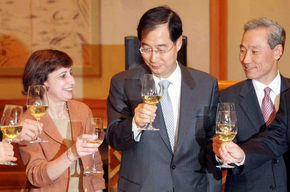 |
|
From left, the top U.S. negotiator Wendy Cutler, South Korea's former finance minister Han Duk-soo and Cutler's counterpart Kim Jong-hoon.
|
S.K.-U.S. free-trade deal may see slower going
With the Democratic Party largely sweeping U.S. congressional elections, it will likely be even more difficult for the South Korean government to push forward with its demands in the free trade agreement (FTA) currently being negotiated with the U.S. The nation’s FTA experts said that the United States would most likely further tighten its markets and urge South Korea to open its markets more, citing the Democratic Party’s stronger level of protectionism for U.S. domestic industries. Professor Jeong In-gyo of Inha University in Incheon predicted that U.S. Congress would not stop the ongoing negotiations with South Korea on the FTA, but would hold fast to its current position over the automotive, agricultural, and textile industries. According to Lee Jun-gyu, a researcher at the Korea Institute for International Economic Policy (KIEP), as the Democratic Party has a closer bond with trade unions and a keen interest in solving the domestic unemployment problem, it will strengthen its pressure regarding demands in the automotive sector, especially. Sources in Washington forecast that Rep. Sander Levin of Michigan and Sen. Max Baucus of Montana, who have taken the lead in putting pressure on South Korea to make concessions in the FTA, will occupy important positions in the new U.S. congress set to convene next year, positions such as the heads of the House Appropriations Committee and the Senate Committee on Finance. Rep. Levin has represented the U.S. auto trade union in Michigan, the center of the U.S. auto industry, and Sen. Baucus is from Montana, whose main product is beef, which has recently begun to be exported again to South Korea after a ban beginning in 2003. The 5th round of FTA negotiations will be held in Montana next month due to lobbying by Sen. Baucus.Prof. Lee Hae Yeong of Hansin University said, "Korea’s demands, such as easing the anti-dumping duty, will likely be harder to accept by the U.S." Prof. Jeong said, "The negotiators will see less flexibility [from the U.S. side], and to extend Washington’s Trade Promotion Authority (TPA), which will expire in the first half of next year, will be hard, as well." Under the TPA, the final free trade deal would not require ratification from Congress. Jeong Tae-in, former secretary of the presidential office, said, "The government most likely will have no choice but to abandon the scheduled timetable [for completing the FTA]." [englishhani@hani.co.kr]





